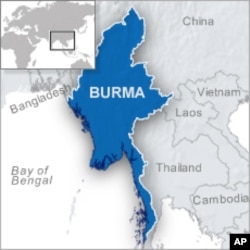Burma's opposition democracy party has said it will not contest controversial elections expected this year because of strict election rules. The decision means Burma's strongest opposition party may be outlawed for failing to register.
Leaders of Burma's National League for Democracy (NLD) say the party will not take part in parliamentary elections.
Last week, detained NLD leader Aung San Suu Kyi voiced opposition to contesting the elections, saying the rules were unjust.
The military government's election laws force all parties to expel members with criminal records, including political prisoners such as Aung San Suu Kyi. They also require parties to swear allegiance to the 2008 Constitution, which guarantees the military a quarter of parliamentary seats regardless of elections.
Perhaps most troubling, the rules require all parties to register by May or face dissolution.
Thailand-based Human Rights Watch Burma researcher David Mathieson says the NLD decision underscores how deeply unfair election planning has been under the government known officially as the State Peace and Development Council.
"The whole process has been basically stage-managed by the regime to get the result that they want," said Matheison. "Which is, a nominally civilian parliament that will prop-up continued military rule. So, under these circumstances there is nothing genuine or progressive about the elections that the State Peace and Development Council are planning. And, it is no surprise at all that the NLD have decided to not take part in it."
Mathieson says the election rules appear designed to split opposition parties, but he says the NLD decision is a show of unity that the international community should support.
The United States has called the elections rules a mockery of the democratic process. Many other countries have criticized election planning as deeply flawed and unfair.
But Mathieson says too many of Burma's neighbors are optimistic about the elections, which the government has called part of its "road map to democracy."
"I think there is a very dangerous thought process spreading that even though these elections will be imperfect and will not bring about immediate change, they are at least a start of something," added Mathieson. "They are the start of some kind of change in Burma. And, I think that is dangerous thinking in some ways because that leads you into actually justifying what the SPDC is doing."
Burma's government has yet to announce a date for the elections, which will be the first in two decades.
The National League for Democracy won Burma's last elections in 1990, but the military refused to give up power.
Aung San Suu Kyi has been kept under house detention for most of the time since and the government has jailed more than 2,000 political prisoners, many of them NLD members.




